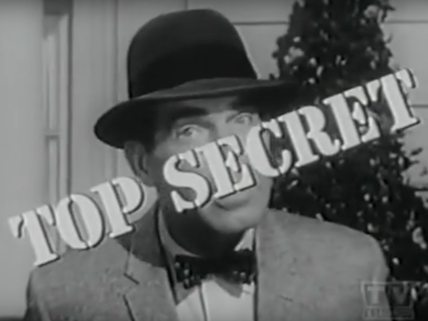The Sitcom and the Surveillance State
Friday A/V Club: My Three Sons vs. Good Times

One of the weirdest half-hours of nominally normal 1960s television is "Top Secret," a 1963 episode of My Three Sons. This almost invasively wholesome series starred Fred MacMurray as Steve Douglas, an aeronautical engineer raising three boys after his wife's death. In this installment, he has to work at home on a classified project; to keep everything secure, the house is put under surveillance.
"We'll handle this job as though the Douglas family was out to blow up New York City," one agent explains to his colleagues. "Every word, every move, every meaningful silence—that's our assignment, from Top Level Pentagon." An apparatus built to combat external and internal threats will be used instead on an ordinary American family, for what we are assured is the common good.
For the rest of the episode the government invades everyone's privacy, but the biggest victims appear to be the feds themselves, who are bored to tears by what they find. They file dreary reports on a young boy's movements; they tap the family's phone, yielding nothing but the halting progress of a teenager's love life. At the end, Fred MacMurray's character breaks the fourth wall and addresses the audience directly:
You know, this security thing was a little tough on my family for a while, but, well, you can see that it was necessary. Of course, now that the project is completed I can tell you what it was all about. You see, what I was really working on was a type of missile—
And then the words TOP SECRET appear over MacMurray's face and his next several sentences are scrambled. The security system that hovered over the Douglases turns out to be in our homes too, intercepting information before it can be heard on our televisions. It is difficult to describe this scene without it sounding deeply creepy, but the show presents it as perfectly benign. There's even a laugh track:
In my book The United States of Paranoia, I contrasted that episode with a bicentennial-year edition of another sitcom, Good Times. (The summary above is adapted from my write-up in the book.) By 1976, the country had seen all sorts of official crimes exposed, from Watergate to COINTELPRO. Between that and the larger cultural revolution of the '60s and '70s, audiences were more willing to accept stories about the national security state abusing its power, even in a genre like the situation comedy. So when Good Times did a story about an ordinary American family falling under federal surveillance, it took a rather different approach to the subject. Here the FBI is shown callously disregarding its targets' liberty, privacy, and well-being, with disastrous results.
This is how much pop culture can change in 13 years:
Part two of three:
Part three of three:
As you may have noticed, "The Investigation" ends with John Amos looking directly at the camera, like Fred MacMurray at the end of "Top Secret." This time there's no laugh track.
(For past editions of the Friday A/V Club, go here.)
Editor's Note: As of February 29, 2024, commenting privileges on reason.com posts are limited to Reason Plus subscribers. Past commenters are grandfathered in for a temporary period. Subscribe here to preserve your ability to comment. Your Reason Plus subscription also gives you an ad-free version of reason.com, along with full access to the digital edition and archives of Reason magazine. We request that comments be civil and on-topic. We do not moderate or assume any responsibility for comments, which are owned by the readers who post them. Comments do not represent the views of reason.com or Reason Foundation. We reserve the right to delete any comment and ban commenters for any reason at any time. Comments may only be edited within 5 minutes of posting. Report abuses.
Please to post comments


That's a great find, Jesse. I wonder if the writers or producers of Good Times were aware of the episode of My Three Sons.
I watched My Three Sons as a little kid. Guess I need to watch an episode today because, looking back, I have no idea why it's labeled a "comedy."
OBTW, watching Steve Douglas in "Double Indemnity" can be a bit jarring.
Or giving Shirley MacLaine a Benjamin for Christmas in "The Apartment".
Wow, just visited IMDB and boy that Billy Wilder made some movies.
I wish "One, Two, Three" weren't out of print on DVD.
Sorry Jesse, I tried to watch, really I did, but it only took about 90 seconds to realize that My Three Sons hasn't become any more watchable than it was when I was a kid. I was lucky to have parents who didn't care for family sitcoms, but part of the torture of visiting my grandparents was being forcibly subjected to that particular show; I don't think I ever made it more than five minutes before taking my book or game of solitaire to another room. My hatred ran so deep that the first time I saw Double Indemnity, in my early teens, I almost gave up at the first sight of Fred McMurray; luckily, my parents convinced me that once things got rolling, I'd forget that I was watching the same guy who played the gratingly wholesome dad on my least favorite show.
My grandmother liked Lawrence Welk.
Yes, that was another part of the weekly routine. Good times.
Why do black families hate America? Oh, yeah, nevermind.